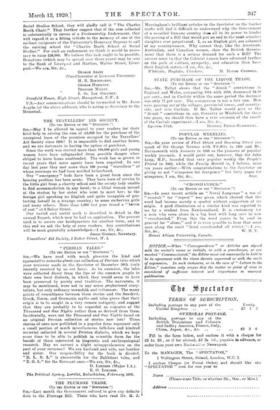" PERSIAN TALES."
[To THE EDITOR OF THE " SPECTATOR."1 Sin,—We have read with much pleasure the kind and appreciative remarks about our collection of Persian tales which your reviewer made in the Spectator of December 20th (only recently received by us out here). As he surmises, the tales were collected direct from the lips of the common people in their own local dialects, in which they would seem to have been preserved by purely oral tradition. The narrators, it may be mentioned, were not in any sense professional story- tellers, but only ordinary townsfolk and tribesmen. The many points of resemblance between these stories and the Sanskrit, Greek, Norse, and Germanic myths and tales prove that their origin is to he sought in a very remote antiquity, and suggest that they are probably to be regarded as cognates of the Thousand and One Nights rather than as derived from them. Incidentally, were not the Thousand and One Nights based on an original Persian collection of stories now lost? These stories of ours now published in a popular form represent only a small portion of much miscellaneous folk-lore and kindred material collected in several Persian dialects, which we hope some time to be able to publish in ecientifio form for the benefit of those interested in linguistic and anthropological research. May we correct a slight misapprehension on the part of your reviewer? We are husband and wife, not brother and sister. Our responsibility for the book is divided. " D. L. R. L." is answerable for the Bakhtiari tales, and "E. 0. L." for the Kermani ones.—We are, Sir, &c., D. LORIMER (Major I.A.).










































 Previous page
Previous page